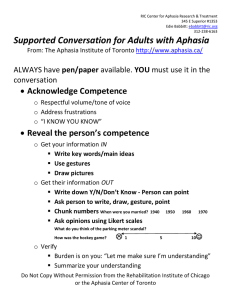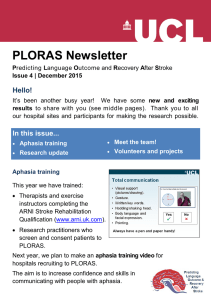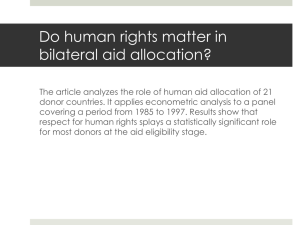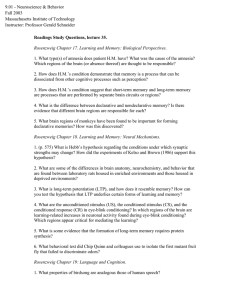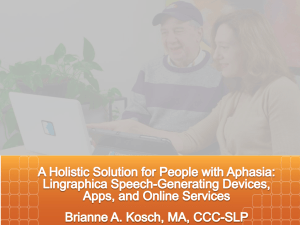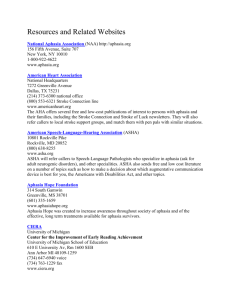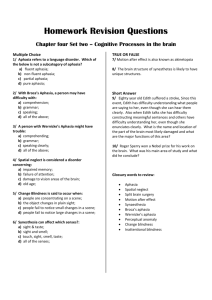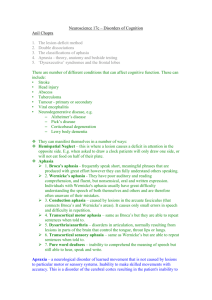British Aphasiology Society Biennial International Conference Senate House,
advertisement
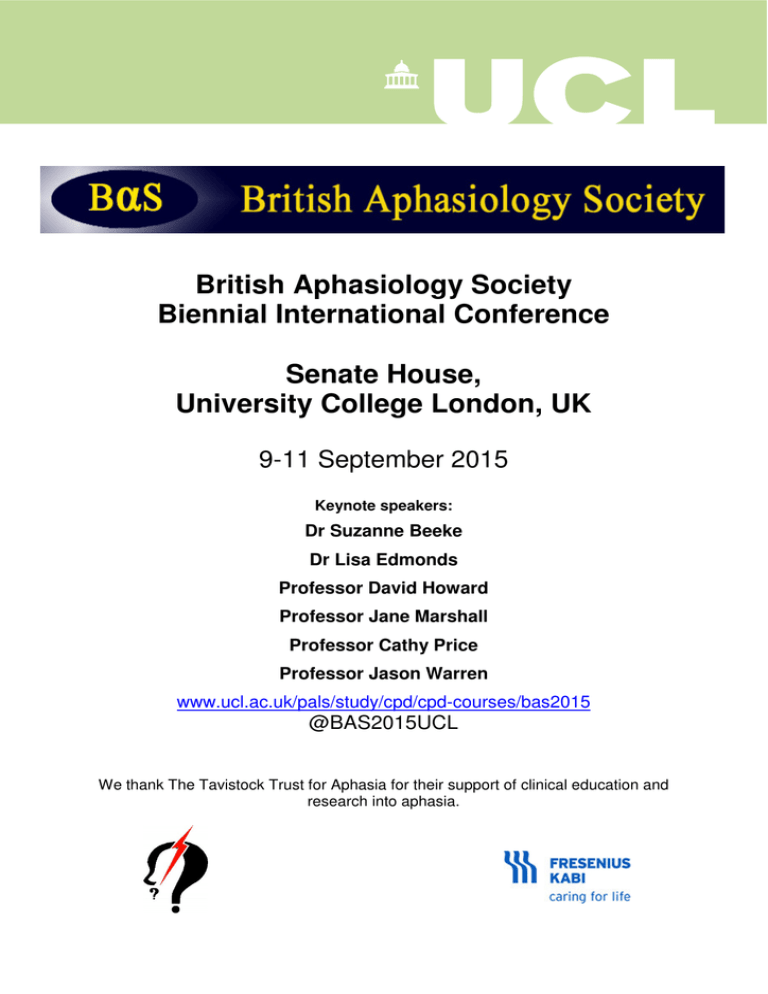
British Aphasiology Society Biennial International Conference Senate House, University College London, UK 9-11 September 2015 Keynote speakers: Dr Suzanne Beeke Dr Lisa Edmonds Professor David Howard Professor Jane Marshall Professor Cathy Price Professor Jason Warren www.ucl.ac.uk/pals/study/cpd/cpd-courses/bas2015 @BAS2015UCL We thank The Tavistock Trust for Aphasia for their support of clinical education and research into aphasia. BAS International Conference onference 9 -11 September 2015, London Programme at a glance WEDNESDAY 9.30 – 10.45 10.45 – 11.00 11.00 – 12.00 Beveridge Hall 12.00-1.15 Beveridge Hall Registration and coffee Welcome Keynote: Dr Lisa Edmonds The Clinical and Theoretical Implications of Verb Network Strengthening Treatment (VNeST): What We have Learned So Far Chair: Paul Conroy SESSION: VERBS, SENTENCES AND CONNECTED CONNEC SPEECH - Chair: Paul Conroy LUNA (Linguistic Underpinnings of Narrative in Aphasia): A novel biographical narrative intervention in aphasia – two single case pilot studies Madeline Cruice, Lucy Dipper & Rachael-Anne Knight Retrieval not rules: A new approach to connected speech in aphasia Rachel Hatchard, Elena Lieven & Ruth Herbert 1.15 – 2.45 2.45-3.45 Beveridge Hall 3.45-4.05 4.05-5.45 The effect of speaker modality on sentence comprehension in people with aphasia Caroline Newton, Anna Davis & Carolyn Bruce Lunch, exhibitors, posters in Macmillan Hall Keynote: Dr Suzanne Beeke Conversation partner training: what is it and does it work? Chair: Carolyn Bruce Comfort break PARALLEL SESSION: INTERACTION AND PEER PARALLEL SESSION: NEW DEVELOPMENTS SUPPORT - Chair: Jane Maxim Chair: Carolyn Bruce Beveridge Hall Woburn Suite Candidacy for conversation partner training: Findings from a Dutch implementation study Sandra Wielaert, Karen Sage, Majanka Heijenbrok & Mieke van de SandtSandt Koenderman Evolution and dissolution of aphasia: Parallels and diversions Chris Code Communication Interaction between Doctors and Persons with Aphasia after Stroke: The Use of Conversation Analysis in an Acute Stroke Unit Setting Bridget Flanagan, Sue Franklin & Rosie Gowran Developing peer partnership Bonnie Studd, Sally McVicker & Helen Mann 5.45 Beveridge Hall 6.00 Memory systems for discourse in aphasia Madeleine Pritchard, Lucy Dipper, Dipper Katerina Hilari & Naomi Cocks Early recovery profiles of language and executive functions in the first twelve weeks post brain injury Nancy Barber & Claire Penn Structuring therapy fidelity assessment in clinical aphasia research: An example from the VERSE Trial Erin Godecke, Elizabeth Armstrong, Natalie Ciccone, Sandy Middleton, Tapan Rai, Audrey Holland, Dominique Cadilhac, Anne Whitworth, Miranda Rose, Graeme J. Hankey & Julie Bernhardt Awards Wine reception sponsored by Fresenius Kabi Ltd www.bas.org.uk P a g e |2 BAS International Conference onference 9 -11 September 2015, London THURSDAY 9.30-10.30 Beveridge Hall 10.30-11.00 11.00-12.15 12.15-1.45 1.45-2.45 Beveridge Hall 2.45-3.10 3.10-4.50 Beveridge Hall Keynote: Professor Jason Warren The progressive aphasias: beyond language Chair: Rosemary Varley Coffee PARALLEL SESSION: DEMENTIA PARALLEL SESSION: BEYOND THE SINGLE WORD Chair: Madeleine Pritchard Chair: Rosemary Varley Beveridge Hall Woburn Suite uite Formulaic language as a measure of disease progression in dementia Vitor Zimmerer, Jason Warren, Fiona Potter, Camilla Clark, Philip Fletcher, Chris Hardy, Jonathan Rohrer & Rosemary Varley Variation and changes in code-switching code in multilingual aphasia Monica I. N. Knoph, Marianne Lind & Hanne Gram Simonsen Holding onto words: retraining in Semantic Dementia can improve use, understanding and retention of words Sharon A. Savage, Olivier Piguet & John R Hodges Using eye tracking to investigate silent sentence reading by people with aphasia Anneline Huck, Madeline Cruice, Robin Thompson & Jane Marshall Toward a Transcription-less Transcription Clinical Better Conversations with Primary Progressive Aphasia (BCPPA): Presenting Assessment of the Functionality of Personal Storytelling results from the first phase of Gloria Streit Olness, Oln Stacy Nunnelee & development of a novel communicationcommunication Abby Stines training package for patients and families Anna Volkmer, Charlotte Char Wilkinson, Suzanne Beeke & Michael Kopelman Lunch, exhibitors, posters in Macmillan Hall Keynote: Professor Jane Marshall Use of technology in aphasia therapy Chair: Suzanne Beeke Comfort break SESSION: TECHNOLOGY IN THE MANAGEMENT MAN OF APHASIA Chair: Suzanne Beeke Video-based based script training for aphasia over the Internet: An outcome study Kerstin Bilda, Elisabeth Meyer, Marie arie Leienbach, Toni Rietveld, Erica Lotgering, Laura Bock & Marina Ruiter Self-Administered Administered Naming Therapy for Aphasia (SANTA): an app pilot study Sue Franklin, Conor Higgins, Stephanie Gilligan, Coimhe Knox, Laura Leahy, Gillian Coughlan, Mikael Fernstrom & Orla Muldoon iReadMore: Computer-based Computer rehabilitation for reading impairments in aphasia Sheila J. Kerry, Y. Ong, O. Aguilar, Jenny J Crinion, V. Fleming, W. Penny, J. Hogan, Alex A P. Leff & Zoe V.J. J. Woodhead 4.50-5.10 Beveridge Hall 7.30 Computer Gesture Therapy for People with Severe Aphasia: Effects on tests of spoken naming Abi Roper, Jane Marshall & Stephanie Wilson BAS AGM Conference Dinner at Sarastro, Drury Lane http://www.sarastro-restaurant.com/ restaurant.com/ www.bas.org.uk P a g e |3 BAS International Conference onference 9 -11 September 2015, London FRIDAY 9.00-10.00 Beveridge Hall 10.00-10.30 10.30-12.10 Keynote: Professor Cathy Price Predicting Language Outcome and Recovery after Stroke Chair: Jane Warren Coffee PARALLEL SESSION: THE NEUROSCIENCE PARALLEL SESSION: PARTICIPATION AND QUALITY OF RECOVERY - Chair: Jane Warren OF LIFE - Chair: tbc Woburn Suite Beveridge Hall Brain lesion subtypes associated with aphasia recovery Stefanie Abel, Cornelius Weiller, Walter Huber, Klaus Willmes & Karsten Specht Quality of life in aphasia: An international perspective. A survey of clinician views and practices from 16 countries Katerina Hilari, Anu Klippi, Fofi Constantinidou, Simon Horton, Claire Penn, Anastasia Raymer, Sarah Wallace, Nada Zemva, Linda Worrall Worral A clinically feasible approach to capturing and predicting language performance during recovery from post-stroke stroke aphasia Jennifer Read, Karen Sage & Stephen Welbourne The effectiveness of the biographic-narrative biographic intervention to increase quality of life in aphasia - the participants' perspective p Sabine Corsten, Erika J. Schimpf, Jürgen Konradi, Annerose Keilmann & Friedericke Hardering Investigating phonological and cholinergic therapies for speech comprehension deficits in chronic aphasia: What works and why? Zoe V.J. Woodhead, S. Teki, W. Penny, V. Fleming, Paul Iverson, Jenny Crinion & Alex P. Leff A novel typology to explain changing social networks post stroke and aphasia Sarah Northcott & Katerina Hilari Top 10 research priorities relating to longlong term aphasia Sue Franklin, Dearbhla Harhen, Michelle Hayes & Sasha Mc Manus Lunch, exhibitors, posters in Macmillan Hall Keynote: Professor David Howard Semantic feature analysis therapy in naming Chair: Stefanie Abel 12.10-1.40 1.40-2.40 Beveridge Hall 2.40-4.20 Beveridge Hall SESSION: ANOMIA Chair: Ruth Herbert Semantic Feature Analysis (SFA) for Bilinguals with Aphasia: Cross-Language Cross Recovery in Picture Naming for English-Mandarin English Speaking Adults? Kristen Kiong, Sajilia Bte Jalil, Angie Foo & Susan J. Rickard Liow Investigating priming in anomia Lyndsey Nickels, Shiree Heath & Nora Fieder Semantic priming in healthy speakers and people with aphasia Lucy Dyson, Ruth Herbert, Richard Body & Jane Morgan 4.20-4.30 Beveridge Hall Semantic neighbours in the lexicon: how does their number influence aphasic picture naming performance? Solène Hameau, Britta Biedermann & Lyndsey Nickels Conference close www.bas.org.uk P a g e |4 BAS International Conference onference 9 -11 September 2015, London POSTERS Poster presentations will be displayed throughout Wednesday and Thursday in Macmillan Hall. Presenters resenters are asked to stand by their posters from 2-2.45pm 2 on Wednesday & 1.00-1.45pm on Thursday. Presenters of the five best posters will each receive a App, courtesy courte of 1. The public awareness of aphasia in Saudi Arabia Reem S.W. Alyahya 2. Argument structure constructions elicit verbs from speakers with aphasia Elizabeth Anderson, Ruth Herbert & Patricia Cowell 3. Better Conversations with Aphasia: An e-learning resource Suzanne Beeke, Nicola Sirman, Firle Beckley, Susan Edwards, Kate Swinburn, Jane Maxim & Wendy Best 4. Generalisation of written homophone treatment in aphasia Polly Barr, Britta Beiderman, Saskia Kohen, Marie-Josèphe Marie Tainturier & Lyndsey ey Nickels 5. Listen-In: In: The development and testing of a tablet-based tablet based therapy application for patients with impaired speech comprehension caused by stroke. Phase 1: Development and consultation. Sonia L.E. Brownsett, V. Fleming, Jenny Crinion, David Howard, R Leech, Y. Ong, H. Robson & Alex P. Leff 6. An evaluation of the use of the digit triplet hearing test with adults with aphasia Carolyn Bruce, Evin Lim, Shu Yi Lim & Caroline Newton 7. What’s cooking? A comparison of an activity oriented and a traditional programme of therapy on the language performance of people with aphasia. Carolyn Bruce, Caroline Newton & Adam Schwartz 8. Touching the past: an evaluation of object handling sessions at the British Museum with people with acquired aphasia Carolyn Bruce, Waiza Kadri, Rebecca Potter, Laura Philips, Catherine Nolan, Harvinder Bahra & Anne Edmundson 9. Provision of information for people with aphasia Beatrice Clarke & Clare M. McCann 10. The UCL Communication Clinic Michael Dean, Carolyn Bruce & service users 11.. What counts? An investigation of countability and semantic number Nora Fieder, Lyndsey Nickels, Britta Biedermann & Wendy Best 12.. Direct speech in Dutch aphasic talk-in-interaction: talk A single case study Rimke Groenewold, Roelien Bastiaanse, Esther de Raad, Tom Koole & Mike Huiskes 13.. Clinical guidelines for aphasia in stroke management in Scandinavia Line Haaland-Johansen & Marianne Lind www.bas.org.uk P a g e |5 BAS International Conference onference 9 -11 September 2015, London 14.. Exploring the use of formulaic expressions in people with agrammatism Claudia Heilemann,, Vitor Zimmerer, Rosemary Varley & Suzanne Beeke 15.. The UCL Aphasia Research Group - sharing research across the clinical and academic SLT world Anna Volkmer & Claudia Heilemann 16.. Words of the Week: Using digital technology technology to practise proper noun retrieval Laorag Hunter & Amy Hanschell 17.. The development of an aphasia battery for Qatari/Eastern Arabic Tariq Khwaileh, David Howard, Ruth Herbert & Eiman Mustafawi 18.. The role of semantically rich gestures in aphasic conversation Judith Kistner, Jane Marshall & Lucy Dipper 19.. Identity in talk of people with primary progressive aphasia. A multi-case multi case study Anna-Maija Korpijaakko-Huuhka, Leena Rantala & Merja Karjalainen 20.. Perceptions of maintaining and developing therapeutic therapeutic alliances in stroke rehabilitation: A metameta ethnography Michelle Lawton, Gillian Haddock, Paul Conroy & Karen Sage 21.. Reading Comprehension in Aphasia: It’s more than the words Julie Morris, Janet Webster, David Howard, Maria Garraffa, Jenny Malone & Lois McCluskey 22.. A quantitative measure of functional communication skills in German: a German version of the new ANELT-CU scoring system Elisabeth Meyer, Marina Ruiter, Kerstin Bilda, Toni Rietveld, Erica Lotgering, Laura Bock & Marie Leienbach 23.. The CommuniCATE project (enhancing Communication in Aphasia through Technology and Education) – presentation of a) project protocol and b) case study of the use of technology techno in dysgraphia intervention Katie Monnelly 24.. Can assistive technologies compensate for writing impairments in people with aphasia? Becky Moss, Jane Marshall, Celia Woolf & Katerina Hilari 25.. Social support after stroke and aphasia: a systematic review of qualitative and quantitative studies Sarah Northcott, Becky Moss, Kirsty Harrison & Katerina Hilari 26.. When does transcranial Direct Current Stimulation (tDCS) best enhance therapy for chronic postpost stroke aphasia? A case study Margaret Sandars, Lauren L. Cloutman & Anna M. Woollams 27.. Using video observations and interviews to explore the nature of interactions between people with aphasia and healthcare professions in Early Supported Discharge (ESD) rehabilitation: preliminary findings Ciara Shiggins, Simon Horton & Valerie Pomeroy 28.. Introducing a validated Patient Reported Outcome Measure - The Aphasia Impact Questionnaire 21 Kate Swinburn, Eleanor Pearce-Willis, Willis, Leslie Smith, Kate Gander, Joanna Sweeney, Madeline Cruice & Sally McVicker www.bas.org.uk P a g e |6 BAS International Conference onference 9 -11 September 2015, London 29. Effects of standard versus speed--focused focused therapy on lexical access in picture naming and composite picture descriptions in post-stroke stroke aphasia Christina Sotiropoulou, Paul Conroy & Matthew Lambon Ralph 30.. Long Term Assessment of Word Retrieval as a Memory Memor Modifier Jacqueline Stark 31.. Restoration of conceptual knowledge in semantic dementia: generalisation and maintenance of rere learned words Aida Suarez-Gonzalez, Sharon Savage & Diana Caine 32.. Quality of communication life in patients with fluent aphasia Mile Vuković, Mirjana Petrović-Lazić & Irena Vuković Vukovi www.bas.org.uk P a g e |7
